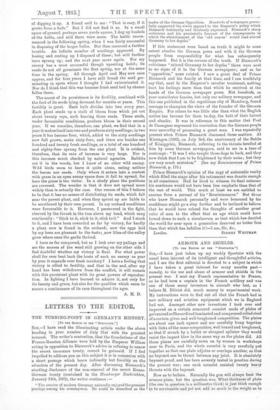LETTERS TO THE EDITOR.
THE TURNING-POINT IN GERMANY'S HISTORY.
[TO THE EDITOR Or THE " SPECTATOR.")
have read the illuminating article under the above beading in your number of July 31st with the greatest interest. The writer's contention, that the foundations of the Franco-Russian Alliance were laid by the Emperor William acting in opposition to Bismarck's advice in refusing to renew the secret insurance treaty, cannot be gainsaid. If I feel impelled to address you on this subject it is in connexion with a short passage which bears indirectly but forcibly on the situation of the present day. After discussing Bismarck's startling disclosure of the non-renewal of the secret Russo- German treaty (contained in the Hamburger Nachrichten, 'anuary 24th, 1892), the writer continues :-- " The creator of modern Germany naturally enjoyed the greatest Prestige,amOng his countrymen. HO could be described as the leader of the German Opposition. Ifundreets of newspapers power- fully supported the views opposed to the Emperor's policy which Bismarck 'habitually and fearlessly expressed. Bismarck's sharp criticisms and his pessimistic forecast of the consequences to which the abandonment of the `old course' would lead stirred Germany to her depths."
If this statement were based on truth it might to some extent absolve the German press and with it the German people from responsibility for what has subsequently happened. But it is the reverse of the truth. If Bismarck's criticisms "stirred Germany to her depths" there were next to no signs of it in the German newspapers ; and as for "opposition," none existed. I saw a great deal of Prince Bismarck and his family at that time, and I can truthfully say that, next to the Emperor's cavalier treatment, nothing
hurt his feelings more than that which he received at ,the bands of the German newspaper press. Not hundreds, as your contributor fancies, but only one solitary newspaper, and this one published in the republican city of Hamburg, found courage to champion the views of the founder of the German Empire. For others be was little else than what the English nation has become for them to-day, the butt of their hatred and slander. It was in reference to this matter that Paul
de Cassagnac expressed his conviction that the German people were unworthy of possessing a great man. I was repeatedly
present when Prince Bismarck discussed these matters. At ICissingen (1892), on July 3rd, the anniversary of the Battle of Koniggraz, Bismarck, referring to the threats levelled at him by some German newspapers, said to me in a tone of contempt : "It was I who taught those dogs to bark, and they now think that I am to be frightened by their noise; but they are very much mistaken." (See my Reminiscences of Prince Bismarck, p. 175.) Prince Bismarck's opinion of the orgy of autocratic vanity which filled the stage after his retirement was drastic enough in all conscience. Had he lived to witness its final outcome his anathema would not have been less emphatic than that of the rest of world. This much at least we are entitled to assume from a perusal of his "Reminiscences." But these who knew Bismarck personally and were honoured by his confidence might go a step further and be inclined to believe that he would have echoed the thoughts of another great ruler of men to the effect that an age which could have bowed down to such a simulacrum as that which has dazzled the world for near upon a generation deserved no better fate than that which has befallen it h—I am, Sir, Ste.,


































 Previous page
Previous page